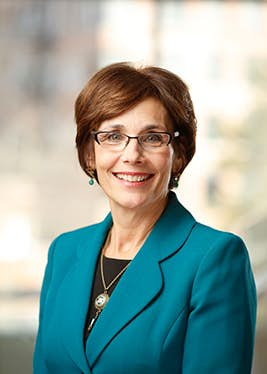Lydia Rotondo Selected to Participate in AACN Leadership Program
By Patrick Broadwater
Monday, July 9, 2018
Lydia D. Rotondo, associate dean for education and student affairs at the University of Rochester School of Nursing, was recently chosen as one of 49 nursing faculty from across the nation to participate in the 2018 American Association of Colleges of Nursing (AACN) Leadership for Academic Nursing Program.
 The year-long fellowship is designed for senior academic administrators at nursing schools and focuses on enhancing key leadership competencies needed in complex nursing education and health care environments. Participants were selected after a competitive review based on educational preparation, experience in academic administration, and their potential to serve as a long-term chief academic administrator of a school of nursing.
The year-long fellowship is designed for senior academic administrators at nursing schools and focuses on enhancing key leadership competencies needed in complex nursing education and health care environments. Participants were selected after a competitive review based on educational preparation, experience in academic administration, and their potential to serve as a long-term chief academic administrator of a school of nursing.
“I’m honored to be among this prestigious group of nurse educators selected to take part in this fellowship,” said Rotondo, who is an associate professor of clinical nursing at the school and director of its Doctor of Nursing Practice Program. “I am excited to network with academic nurse leaders from across the country to explore creative approaches to advance nursing education.”
The year-long Leadership for Academic Nursing Program (LANP) includes an intensive five-day seminar to be held July 29th to August 2 in Chaska, Minnesota, as well as a focused assessment experience, a range of content and exercises related to successful executive leadership, and the opportunity to establish a peer network that fosters long-term partnerships and collegial support.
AACN has engaged more than 600 LANP fellows in professional development activities since the program debuted in 2002. The 2018 cohort of program participants comes from 25 states and represents an array of institution types, including public and private schools, and large academic health centers.
Rotondo, who has directed the UR Nursing DNP program since 2014, was named associate dean for education and student affairs in 2015. In that role, she works closely with program directors, faculty, and students to meaningfully respond to emerging educational needs to meet the health care workforce demands of the future.
Categories: Nursing Leadership

